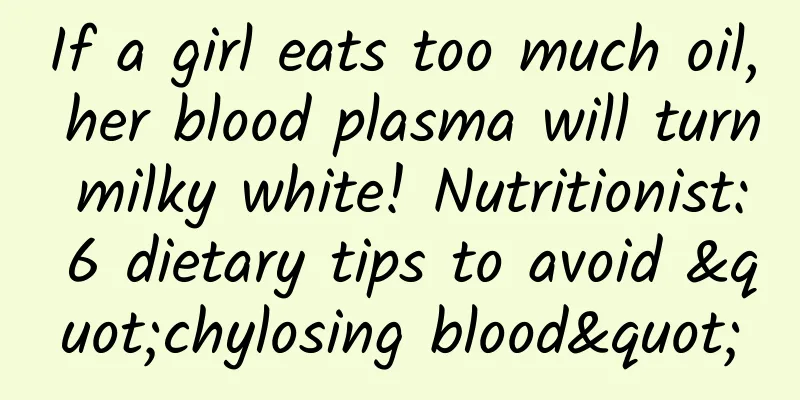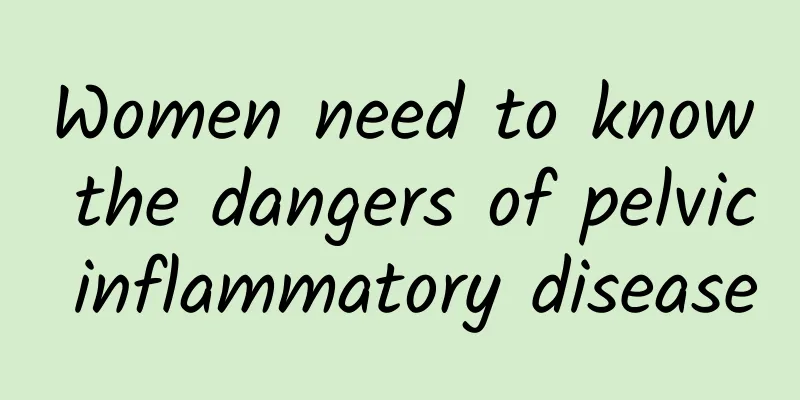If a girl eats too much oil, her blood plasma will turn milky white! Nutritionist: 6 dietary tips to avoid "chylosing blood"

|
If you eat too much oil in your diet, your blood plasma will turn milky white! A few days ago, an 18-year-old female student in Hsinchu went to donate blood. Afterwards, she was notified that she had "chylosing blood". It turned out that the female student ate more and exercised less during the summer vacation, and her weight suddenly increased by 5 kilograms, causing the fat content in her blood to soar. Although the red blood cells can be separated and used, which does not affect the safety of the blood, it is a bit of a pity during this period when blood shortages occur from time to time across Taiwan due to the epidemic. There are several reasons why people occasionally experience chylosing when donating blood: the fat content of the diet before donating blood is high, or the fat intake is too much on a normal basis, or it may be pathological hyperlipidemia. According to statistics from the National Health Administration, the obesity prevalence rate among adults in the country is nearly 50%, and the rate of diseases related to metabolic syndrome is getting higher and higher. This phenomenon also occurs in cases like the female student donating blood mentioned above. Nutritionist Huang Qianrui said that after being referred to the nutrition consultation clinic and given appropriate dietary advice, the patient's condition has improved. What is chylomicronemia? Chylolytic patients often have metabolic problems such as the three highs What is chylomicronemia? Chylomicronemia is when the fat in food enters the blood vessels through the lymphatic vessels in the intestinal wall, causing the concentration of chylomicrons in the blood to increase, making the plasma appear milky or turbid. There are several reasons why people occasionally experience chylosing when donating blood: the fat content of the diet before donating blood is high, or the fat intake is too much on a normal basis. It may also be pathological hyperlipidemia, which leads to abnormal fat metabolism. In particular, patients with chylosing blood often have metabolic problems such as the three highs, which may affect the quality of donated blood. It is recommended to avoid high-fat and high-sugar diets as much as possible, implement weight management, and have regular blood tests to maintain a healthy lifestyle. It is recommended to avoid high-fat and high-sugar diets as much as possible, implement weight management, and have regular blood tests to maintain a healthy lifestyle. [6 dietary tips to avoid "chylosing blood"] In order to protect the health of blood donors and to cherish limited resources, and not to disappoint the love of blood donors, Huang Qianrui recommends 6 dietary guidelines for people with chylosing blood, which can improve blood quality invisibly in daily life: 1. Replace refined bread with whole-grain bread, or partially replace refined flour with homemade whole-grain powder, or brew whole-grain powder (such as quinoa, wheat, germ, brown rice, black rice, etc.) with soy milk instead of fresh milk. It can increase the intake of water-soluble dietary fiber, water-insoluble dietary fiber and B group. 2. Use a variety of vegetables and fruits to increase vitamin C and various phytochemical nutrients, which have antioxidant effects and maintain blood vessel elasticity and prevent aging. If you are really a busy group, you can also appropriately supplement with single vitamin C nutritional supplements instead. 3. Try to replace animal protein with plant protein in one of the three meals, such as: tofu, tofu pudding, soy milk, bean curd skin, bean buns, etc. to replace the main dish of a meal. 4. Cooking oils can be made from plant sources, such as canola oil, olive oil, nuts, cashews, etc., instead of animal fats. 5. Refined sugars and sweetened desserts can cause high triglycerides and lead to hyperlipidemia, so they should be avoided as much as possible. 6. Drink moderately and don’t binge drink. In addition to paying attention to your usual diet, you can also take supplemental health foods to make your nutrition more comprehensive and lay a foundation for your health. Before taking it, it is recommended that you consult a nutritionist who specializes in health foods to assess whether your daily diet is balanced and provide nutrition according to your symptoms, which will be safer and more effective. |
<<: Can you eat sweets to lose weight? You must learn to control the "portion" and "frequency"
Recommend
What are the early symptoms of vaginal candidal infection?
There are many types of vaginitis, and each type ...
Approximate hospitalization costs for excision of cervical precancerous lesions
Cervical cancer, when people hear these words, th...
Losing weight too quickly! Doctor: It is easy to gain weight again and harmful to the body
Using the wrong method to lose weight and detox w...
Treatments for vulvar itching
Vulvar itching is a common condition in women, wh...
Throw away snacks for 3 months to build 6-pack abs
According to the Daily Mail, a 38-year-old Britis...
Explain the symptoms of severe cervical erosion
Clinically, the treatment of severe cervical eros...
Liquid diet helps cancer patients eat Zhongrong recommended menu
It is not easy for cancer patients to maintain go...
Experts introduce five precautions for treating cervical hypertrophy
Cervical hypertrophy is very harmful to women, an...
Recurrence of Bartholinitis
In daily life, many female friends are troubled b...
Common early symptoms of cervical erosion
What are the common early symptoms of cervical er...
Can I eat fruit after cervical hypertrophy surgery?
After surgery for cervical hypertrophy, you can e...
What are the symptoms of cervical hypertrophy?
Cervical hypertrophy is a type of cervicitis, a c...
Fight back the shaky sleeves! Yinyin privately teaches you "3 tricks" to lose weight on your arms at home
Yin Yin, a female star with excellent dancing ski...
When taking care of your diet for pelvic inflammatory disease, be sure to eat a light diet
Choosing a scientific diet for pelvic inflammator...
Causes of menstrual vaginitis
The reason for female menstrual vaginitis is that...









